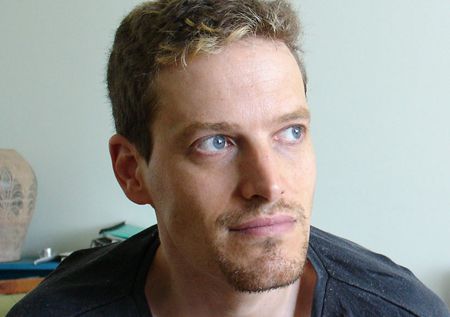Jessica Au from Readings St Kilda chats to Melbourne author Pierz Newton-John about his debut collection of short stories,

Many of the stories in
I very much do. When I first started working as a counsellor on telephone help lines back in my early twenties, I was staggered by the depth of misery that was lurking beneath the surface of normal suburban lives – abuse, addiction, despair, isolation. Every shift I listened to stories of psychological survival worthy of a warzone. It was a stunning revelation, and yet in truth I always had this sense growing up that suburbia was a landscape pregnant with numinousity and horror, mysteries only deepened by the facade of boring calm. At its heart I see suburban life as a collective attempt to smother the anxiety and wildness of human existence in a sort of secure banality. But of course the cracks keep opening up. That is one of the meanings of ‘fault lines’.
Similarly, in ‘Suburban Mystery’, the narrator throws out a question to his surrounds: ‘All those damn orange houses, all those driveways … Who were the people all this belonged to? Are we happy here or not? Nobody was saying.’ Why is it, do you think, that we so often feel this deep curiosity about the lives of others, and for what goes on behind closed doors?
There’s a similar line in ‘Croc’, when the protagonist looks through her blinds to the house across the way and wonders about the stories it hides, and if she herself can be seen. In both cases, I think it’s the character’s longing for recognition: not only for the inner self to be recognised, but to recognise that self in the outside world. It seems to me a sad irony of life that our deepest selves are so alike in their essence, yet the experience of true union with another is so rare and fleeting. When intimacy fails, our next best consolation is knowing that, in our aloneness, we’re not alone!
Several of the characters in
I’m not sure I see them quite as outcasts, but outsiders, sure. Fault Lines wasn’t written to a theme, but it was evident enough when I looked at the stories as a whole that this idea of people longing to connect and belong – and failing to – was a central leitmotif.
I grew up in a family that placed a high value on intellect and even prided itself on a certain critical outsider status. I quickly learned once I got to high school that wider Australian society is deeply suspicious of and even antagonistic towards intellectualism, and I had to go through a painful process of distorting myself into a more acceptable form – never entirely successfully, I might add. Any smart, sensitive kid growing up in Australia probably knows that experience – you can certainly see it in the work of Peter Carey for instance: the brutality of the world so often in garish contrast with the tender inner world of the central character.
Short stories have often been described as a sip, compared to the ‘tall glass of water’ that is the novel. What do you think are the elements that go to towards creating a brilliant work of short fiction?
I’ve heard so many different recipes, and such formulae make sense, but ultimately I don’t think rules are all that helpful, practically speaking. For my part I think there’s only one real hard and fast, and that is that the short story must have a single centre, unlike the novel which may have no centre or many (think of the picaresque mode, for instance, with its loose series of adventures). In a short story you have a certain amount of room to sketch out a milieu and so forth, but ultimately you have to know what it is you’re trying to say, and hunt that quarry ruthlessly. If you can use sleight of hand to disguise that centre until the very last line or even word, that’s when you have a truly brilliant story.
You’ve published stories in several anthologies and journals, including
More than ‘having an impact’, it’s kept me going. Sleepers have been particularly wonderful in that respect: the editors Louise Swinn and Zoe Dattner are just brilliant sponsors of the art, with an openness to fresh voices and a great generosity of spirit.
Short stories don’t pay the bills and they won’t make you famous, so new writers with talent really need that encouragement and appreciation. It’s great to see the burgeoning of vehicles for short stories in recent years. I think it’s important as a new writer to read these publications to get an idea of where the literary scene is at, and to gather ideas. The quality is usually high but reading the occasional misfire is worthwhile too. Pure genius can end up being a dispiriting diet for a new writer.
Tell us about the writers or collections that you’ve loved in the past. What should fellow short-story enthusiasts be reading?
Wells Tower’s Everything Ravaged, Everything Burned remains one of my all-time favourites, a deeply satisfying and rich collection. I’m not overly enamoured of the modern inclination for ultra-plain prose. I like my literature with the occasional pyrotechnic burst, and Tower has the literary chops to pull off that kind of wizardry.
I also found Anne Enright’s Taking Pictures superb. She’s a writer of immense virtuosity. A shrewd, worldly intelligence glints out of every line – irony, but not of the defensive, post-modern variety. Some people find her writing bleak, but to me there are great riches under the austere surface. I recommend both collections as lessons in the short-story form.
Fault Lines
A book by Booki.sh


